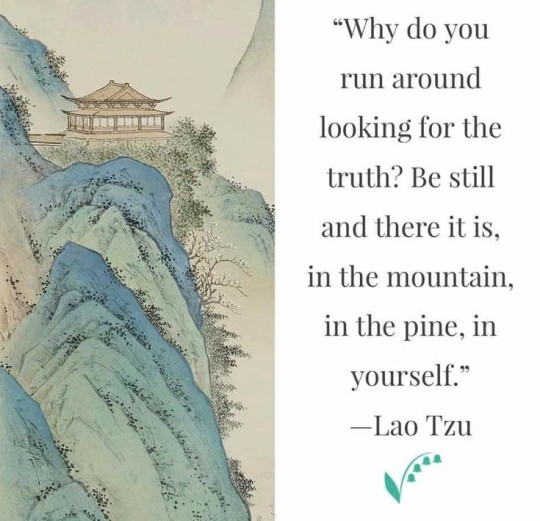#Laozi
Quote
Achieve results, but never glory in them. Achieve results, but never boast. Achieve results, but never be proud.
Laozi, Daodejing, Feng & English tr. (Ch 30)
687 notes
·
View notes
Text
Life is a series of natural and spontaneous changes. Don't resist them; that only creates sorrow. Let reality be reality. Let things flow naturally forward in whatever way they like.
Lao Tzu
176 notes
·
View notes
Text
Watch your thoughts; they become words.
Watch your words; they become actions.
Watch your actions; they become habits.
Watch your habits; they become character.
Watch your character; it becomes your destiny.
Lao Tzu
#lao tzu#laozi#quotes#life quotes#inspirational quotes#inspiring quotes#inspiration#motivation#spilled ink#spilled thoughts#life#thoughts#aesthetic#words#text
299 notes
·
View notes
Text
Stone Egg theories + Luzhen
All are asks are connected to this post made about: what if Stone Monkeys could naturally reproduce asexually via converting their body into a new Stone Egg?
All images have transcripts btw.
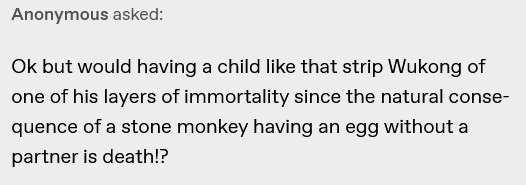
1: Possibly. Wukong has a *lot* of immortalities. But accidentally creating a Stone Egg asexually takes a lot out of him physically and spirtually. His soul gets a permanent hit to it. The whole point of the Stone Egg is for either a monkey with a large familial group to produce an heir without a mate, or the last of a troop to fling a piece of hope into the future. Most don't survive, but some do. It helps to have a lot of magically talented friends/family around to stabilize your body once the egg-creating process has begun so you can heal. Though I bet most single monkeys prefered adoption if at all necessary - accidentally giving the Stone Monkey kind a hyper-active parental instinct towards non-related infants of similar species.
He probably gets cravings for a lot of rocks, metal and bones in the process.
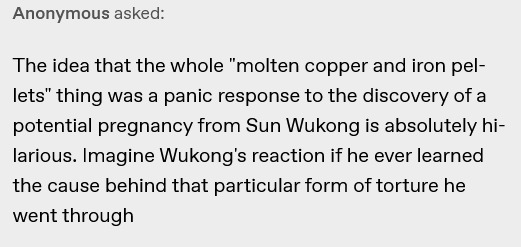
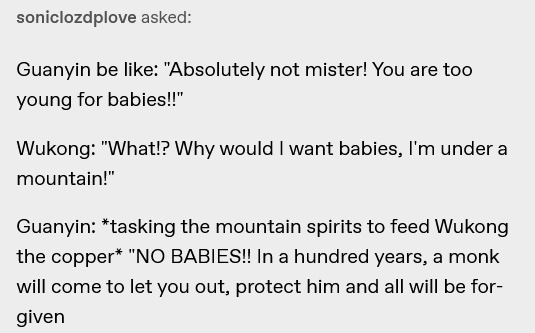
2 & 3: (@soniclozdplove) Guanyin realised that she gotta put her stone monkey on birth control if they were gonna keep him underground. Her brain jumped to "He's made of rock right? rock spirits eat metal... right?? Crap, it's the only thing down here." and cue molten copper and iron pellets for dinner. The question is; was it even that painful for Wukong? Man takes out his organs a bunch of times and bathes in hot oil in Jttw without complaint. Odds are in the moment it felt like the worlds worse heartburn/spicy food burn since he really is made of earth materials. XD
He probably felt super grateful once he realized why Guanyin was feeding him molten metal. He didn't want kids in that circumstance either!
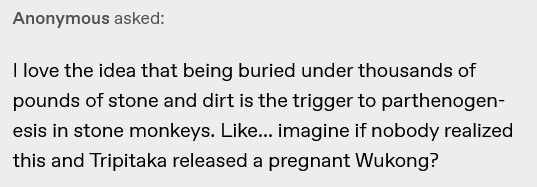
4: A furiously confused pregnant Wukong! He immediately starts yelling at Gold Star for answers, and has to be talked down from trottling the Buddha himself for this. Tripitaka is panicking, he's never been around a pregnant person before!
Wukong doesn't even need the circlet in this verse. Guanyin just gives him false labor contractions and he's behaving immediately. He probably has to lug the egg in his body around for some extra time, maybe even until the Journey is over depending on how funny the Buddha or Bixia Yuanjun (goddess of childbirth) is feeling.
Macaque sees Wukong pregnant this way and is confused, dismayed, and yelling "Who's the father!?" at every Pilgrim. It takes him a while to understand that the Stone Egg happened cus of SWK being essentially slow-cooked underground for 500 years. Even if Macaque plays nice with the Pilgrims afterwards, he's still glaring at anyone who comes near Wukong and "their" egg.
Wukong endears himself to many people simply because he's with child. Probably gets an extra godly nickname (something like "Meihou-Wangmu" a pun on his Handsome Monkey King title + Queen/King Mother) refering to him as a fertility figure - women seeking luck with having/not having children approach Wukong asking for his blessing, and odds are it works because of who his creator is. XD
But he also attracts unique threats that the pilgrims have to personally destroy to protect him - Krasues and Manananggals anyone?
The second the Journey is over, Wukong kneels over and with an literal earth-shattering scream out *pops!* a little Stone Egg. All happy and cracking open minutes later. His and Macaque's first born isn't told the details of their creation for a long time.
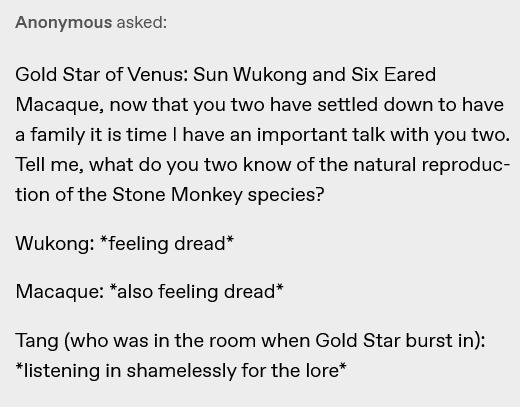
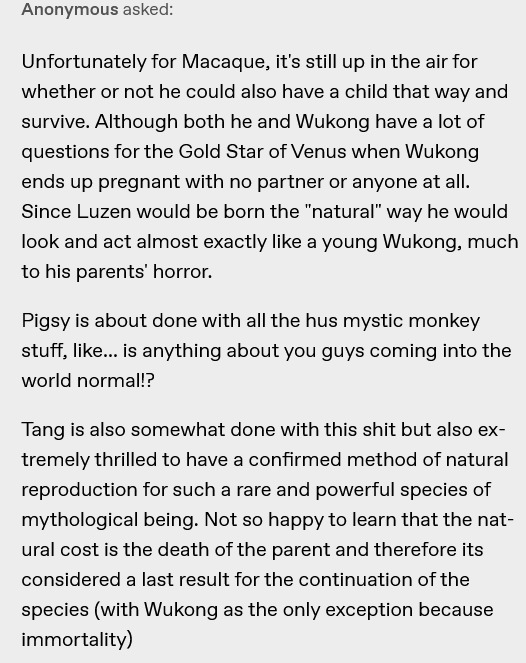
5 & 6: Gold Star gives Shadowpeach the Stone Monkey version of The Talk and warns them never to get buried alive unless they're 100% sure about it. Macaque and Wukong are terrifed into not having kids until Guanyin let sit slip that the "regular way" should work too.
In "The Monkey King and the Infant" au; Gold Star was a little more than shocked to hear about MK/Xiaotian's creation XD
Macaque is sadly unlikely to ever carry a "clone egg" to term or survive the full process. His body is a lot smaller/weaker than Wukong's and he was deprived of a lot of nutrients as a newborn (stuck on the moon = very few vitamins). So if he ever got triggered into parthenogenesis, his body would likely just refuse to create an egg. No gas in the tank.
Baby Luzhen is born from SWK, and he immediately takes out the roof/part of the Jade Palace with eye lazers. Giggling, he fails to notice the looks of horror on his family's faces.
Pigsy shoudl be just used to this nonsense by now. In the TMKATI Au; MK was a rogue comet Harbringer baby, the twins were freebies from Diyu, Yuebei was the reincarnation of one of their greatest enemies, the twin boys are likely reincarnated lunar node deities, and ofc now Luzhen decides to spawn in like a chicken egg.
I love the idea of Tang hearing all these gory details like;

Tang: "This is like finding a living dinosaur egg or a thylacine! Imagine if any of your children married a regular monkey demon- it could completely bring back your species!"
Wukong + all Three Realms shudder at the thought - Wukong mostly because he aint never doing that again. Gold Star of Venus and Lao Tzu hum, intrigued at the thought.
Tang starts crying when he realises that single-parent Stone Monkeys would likely be born orphans. It's so sad! :'(

6: Nah, Luzhen pops out all newborn baby. You see, being born fully-developed from a Stone Egg is a huge rarity; only occurring when the whole troop has died out and the egg is left on its own for thousands of years. If a Stone Monkey parent is "awoken" early enough (like within say 500-600 years) in the Egg's development and tended to quickly, their bodies stabilize into a long, but far less dangerous form of pregnancy. Its a safeguard for in case the pregnant survivor of an extinct group is found by a new troop, the parent survives and can live to possibly reproduce with the new unrelated group (higher chance of viable mates).
The only sacrifice being that the babies in these "soft-boiled" Stone Eggs are a lot weaker, premature even. The eggs themselves having a much higher chance of being empty or just absorbing straight back into the parent. Many who survived the process just sighed, it was the law of nature - why risk a possible baby for the parent when survival is preferred?
Luzhen is able to be born simply because Wukong has such a solid support system and healthcare available to him.
Ty for all these asks! I guess I should make a special "Stone Egg talk" tag for these ideas!
#stone egg talk#jttw theories#lmk#lego monkie kid#sun wukong#liu er mihou#six eared macaque#the monkey king and the infant#the monkey king and the infant au#journey to the west#jttw#sun luzhen#lmk sun luzhen#pregnancy tw#lmk aus#jttw aus#gold star of venus#lao tzu#laozi#guanyin#lmk guanyin#lmk lao tzu#jttw stone egged au
54 notes
·
View notes
Quote
Care about people's approval and you will be their prisoner.
Laozi
#Laozi#thepersonalwords#People#quotes#literature#life quotes#author quotes#prose#lit#spilled ink#writers on tumblr#writing inspiration#poets on tumblr
47 notes
·
View notes
Text

Yet mystery and imagination arise from the same source. This source is called darkness...
-- Laozi
(Innsbruck, Austria)
#darkness#street lights#colors#laozi#travel photography#night thoughts#mystery#imagination#innsbruck#austria#street photography#quote
210 notes
·
View notes
Quote
The Tao that can be told is not the eternal Tao;
The name that can be named is not the eternal name.
Lao Tzu, Tao Te Ching (translated by Wing-tsit Chan)
155 notes
·
View notes
Text
Laozi's Powerful Diamond Cutter
My first article of 2024 focuses on Laozi's "diamond cutter" (jingang zhuo, 金鋼琢; a.k.a. "diamond snare," jingang tao, 金鋼套), an uber powerful holy treasure. The fillet first appears in chapter six when it is used as a blunt throwing weapon to incapacitate Sun Wukong during his rebellion. It later reappears in chapters 50 to 52 as a mysterious, shiny, white string of pearls used by a buffalo spirit to instantly suck away magic weapons and animals and defeat even destructive elemental attacks, kind of like a personal black hole generator with a built-in pocket dimension. It’s so powerful, in fact, that even the sight of it is enough to make Monkey and a host of other gods flee for their lives.
My article quotes all mentions of the weapon, complete with the original Chinese; explains how it was created; describes the history of terminology that ties the treasure to diamond-pointed tools used by craftsmen west of China to work hard stone like jade; demonstrates that it is a mirrored literary element to Sun Wukong’s headband and Prince Nezha‘s fire wheel; and, finally, explores its influence on three fillet-like throwing weapons from another Chinese vernacular classic.
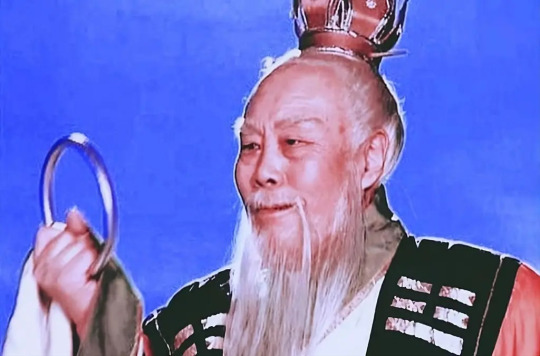
#Journey to the West#JTTW#Laozi#Taishang laojun#diamond cutter#diamond snare#holy treasure#weapon#Sun Wukong#Monkey King#Great King One-Horned Buffalo#Laozi's buffalo#Great King Rhinoceros
30 notes
·
View notes
Text
Can/Do Bad People Cultivate The Great Inarticulate Dao?
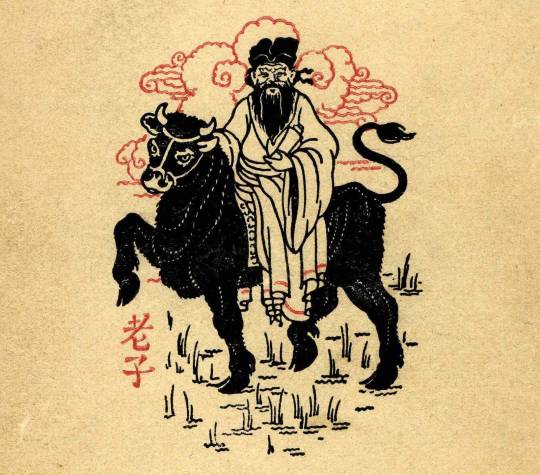
Short answer: Yes, they most certainly do. The reason is the Dao's ability to penetrate and be a part of All Things.
What brings this to my attention is chapter 62 of the Dao de Jing, and I am working with Rudolph G. Wagner and William S. Wilson's translations and Wang Bi's commentaries.
The sections I want to focus on are as follows:
Wilson: "It (the Dao) is a treasure for the good man who is a blessing for all, and a place of support for the bad man, as it would carry him on its back as though he were a child."
Wagner: "It (the Dao) is what is treasured by good men. It is what men who are not good protect."
Two very different translations here. Not sure which one I prefer, but regardless, working with two or more translations is an essential component for studying the Dao de Jing or any other Daoist literature, as an English-only reader.
The first thing that is glaring to me is the Dao's non-discriminatory qualities. For the bad person and the good person alike, both confide in the Dao, even if their crafts differ. For the bad man, we will use the character of a thief, and for the good man, someone who is pious and an upstanding, law-abiding citizen, and perhaps someone with privilege (someone with political status or a well-respected business person). If we recall the story of Lord Wenhui and Cook Ding in book three of the Zhuangzi, we can see that even for someone with high status, and more privilege, it is not enough to cultivate the Dao. In that story, Cook Ding astonished Lord Wenhui with his mastery and cultivation of the inarticulate Dao. Rich or poor, rank, privilege, and societal status are never prerequisites for cultivating and mastering the Dao. For more on this story, please take a look at my commentary on this particular section of the Zhuangzi.
So the Dao makes no distinctions between the good and bad man, okay, cool. So does this mean a thief can practice their craft with Virtue and in step with the Dao? According to Zhuangzi, yes. In a section I have not read yet, Robber Zhi's disciples ask him if there is such a thing as the "Dao of thieving?" To which Robber Zhi responds: "Which profession is there that has not its (The Dao's) principles?"
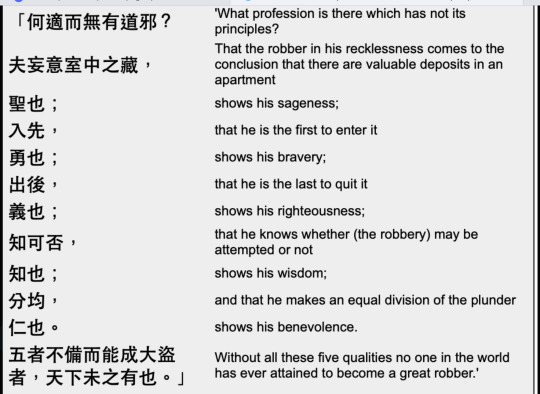
As seen above in the picture, the thief exudes the principles of the Dao.
As suggested by Wang Bi's commentaries on these verses from chapter 62, the one who is bad and practices the Dao, they avoid harm and the punishment of their thievery. When taken at a surface level-reading, this sounds like Daoism or the Dao itself excuses bad behavior. But this is not the case. What this is saying, I think, is that the Dao and Virtue are the bedrock of the world. As suggested in the photo above, the thief cannot but help to practice thievery with at least some virtue and principles that are in accordance with the Dao. Daoism doesn't promote thievery or any kind of bad behavior, but it encourages us to be true to our nature, be true to ourselves and our circumstances, and act accordingly to what Fate presents us.
I wish to impose a suggestion that when a thief practices thievery in step with the Dao and its principles, they can eventually turn away from their life of crime. This sentiment is not explicitly mentioned in the Zhuangzi or Wagner's translations of chapter 62. But if we turn to Wilson's translation of the last few words in his copy of the Dao de Jing, it states as follows:
"Why did the men of old treasure this Way? Didn't they say that those who seek it out will pick it up along the way, and that those who have been caught like fish in the nets of crime will be pardoned and given new life? Thus, it makes all under Heaven treasure it.
Compare it with Wagner's:
"What is the reason why the ancients valued this Way? Did they not say: If the good ones strive by means of the Way, they will achieve it, while those who have committed crimes avoid punishment by means of The Way? That is why it (The Dao) is most valued by All Under Heaven."
As you can see, Wagner's translation still gives off a vibe that the Dao excuses those who commit crimes and can thus avoid apprehension and repercussions. While this is one correct way to look at it, we must dig deeper into what the text is trying to tell us. I will take advantage of this opportunity to stress again the importance of working with two or more translations with these kinds of texts.
Focusing on Wilson's translation gives more leniency to my imposition that the thief can eventually turn away from their life of crime when they practice Virtue and the principles that are in accord with the inarticulate Dao. While it may be argued that the thief or good man has no choice but to rely on Virtue and the Dao in their craft, as suggested by the photo of the excerpt from the Zhuangzi, I dare say there is a choice. Some people are ultra-violent and have no code of conduct for their crimes; I can attest this much from first-hand, anecdotal experiences from my life as a former thief. We must remember the Dao supersedes and transcends all human-noted distinctions (Zhuangzi chapter 2) and that any Dao that can be articulated is not the Unchanging Dao (Dao de Jing 1). What "is" good and what "is" bad has no room when embarking on the Inarticulate Dao. The only example I can give you, wonderful people, is my own life experience with crime and turning away from that.
When my old using buddies and I would embark on a boosting heist (I'm making this sound all fancy, but it's really just a clever way to steal from department stores in plain sight), we would only steal what we need to get to feel better, get high and put food in our bellies. We never robbed people at gunpoint; no threats or violence had ever ensued. Did we practice thievery in step with Dao and its Virtue? Perhaps, perhaps not. But as suggested in the picture above of Robber Zhi speaking to his disciples, we practiced all of those things unknowingly, of course. It is truly an anomaly that we were never apprehended and faced repercussions. We can throw out any suggestion of white privilege because I was just the driver, not the one actually going into the stores and performing the boost. The ones who got their hands "dirty" were all people of color. Though, I'm not suggesting at all that my hands were ever "clean" because I was just a mere getaway driver. I am simply pointing out that race had no play in our evading of repercussions.
Here we were, as suggested by Wilson's translation, all caught up in the nets of crime such as drug dealing and purchasing, and thievery. I know of two people who have been pardoned and given new life, myself and the one who actually would go in and perform the boost. I've kept in contact with the "master thief" who would actually go into these department stores and perform the boost. He is sober, doesn't steal or boost anymore, and has a well-paying job; and importantly was never arrested for these crimes we committed together. Whether he is telling me the truth is beside the point because I, too, have turned away from my life of crime, and it seems like my friend has, too. If he did face repercussions, then, of course, my white privilege could've been a massive factor in my evading repercussions for these particular crimes. My friend has no reason to lie about this, though. So I can't help but think that both of us (when mainly it was just us two doing the boots/thievery) evaded harm and repercussions because we practiced our craft with Virtue as our bedrock. We are both good people who didn't wish to live such a life that was fueled by petty crime and drugs. With our Virtue still intact, we escaped the vicious cycle of drugs and petty crime.
So, in conclusion, yes, both "good" and "bad" people cultivate the Dao and its Virtue. We should not "gatekeep" the Dao and its teachings to only the good, pious person. The Dao and all its teachings should be available to everyone: the Cook, the beggar, the thief, and the King. The Dao doesn't discriminate between our petty human distinctions, and we should be more aligned with Nature's natural distinctions. Just as the Dao is a treasure for the goodman who is a blessing for all, it (the Dao) is equally there for the bad person and is its place of support.
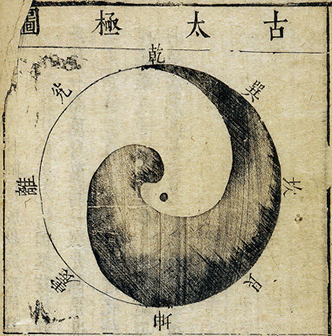
#daoism#philosophy#zhuangzi#dao dejing#taoism#tao te ching#chinese religion#chinese philosophy#lao tzu#laozi#dao de jing
39 notes
·
View notes
Text

Yet mystery and imagination arise from the same source. This source is called darkness.
// Laozi
#photography#ph#venice#venezia#travel photography#italia#italy#night photography#empty#night thoughts#dark streets#darknees#laozi#q#quote#words#mystery
98 notes
·
View notes
Quote
Never bestow honors and people won’t quarrel. Never prize rare treasures and people won’t steal. Never flaunt alluring things and people won’t be confused.
Laozi, Daodejing, Hinton tr. (Ch 3)
114 notes
·
View notes
Text
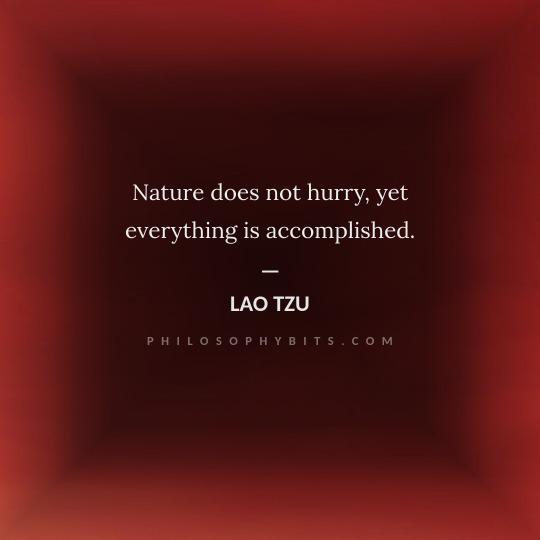
12 notes
·
View notes
Note
How does the diamond snare thing work?
Diamond cutting, from the Ming Dynasty fairy novel "Journey to the West", is the magic weapon of the Taishang Laojun. A dense white circle, also known as the golden steel ring, diamond sleeve; can change, is invulnerable to water and fire, can hit all things, collect all kinds of magic weapons and weapons, and the magic is endless. It was refined by Naikun steel, and it was also refined by Huan Dan. It has spirituality. It was used by Laozi for self-defense when he used it and used this treasure to overthrow Sun Wukong and help Erlang Shen capture him.
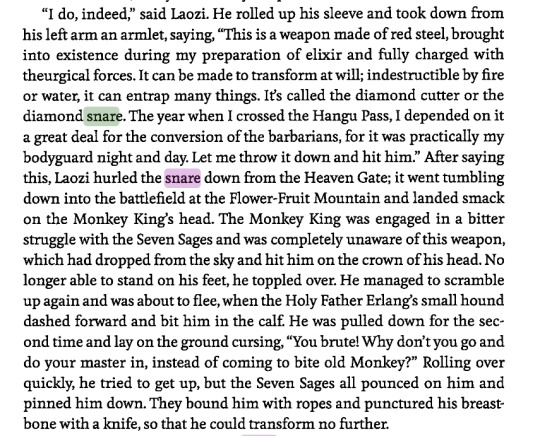
Later, it was stolen by Taishang Laojun's mount "Banjiao Qingniu", and fled to the lower realm to occupy the mountain as a demon. He called himself the One-Horned Rhino King, captured Tang Monk in Jindou Mountain. He used this treasure set to get Sun Wukong's golden hoop, the six demon-subduing weapons of Prince Nezha, and the magic weapons of all the gods and generals were taken away together, even water, fire, thunder, and lightning can be absorbed. Later, the king was subdued by the Taishang Laojun who came down to earth with a fire-type plantain fan. After subduing the green bull demon, he took back the diamond cutter and returned the weapons of the gods. Finally, the diamond cutter became the nose ring of the one-horned green bull.
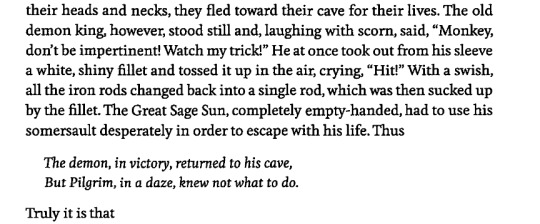

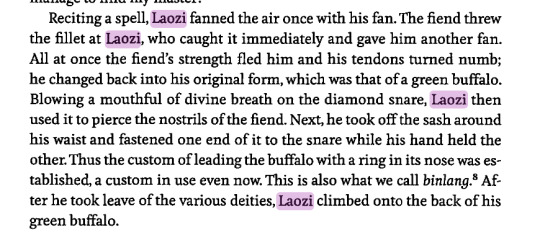
Taishang Laojun is the imperial blacksmith of the Heavenly Court. He has made diamond bracelets, purple, gold, and red gourds, mutton fat jade bottles, golden ropes, plantain fans, seven-star swords, and many other magic weapons. The diamond snare being the most powerful as he used to go down to earth and defeat Sun Wukong after the Tota King, Eighteen Arhats, and other gods in Jindou Cave. Finally, Laojun took away the gold steel bracelet with a plantain fan and subdued the One-Horned Rhino King.
https://baike.baidu.com/item/%E9%87%91%E5%88%9A%E7%90%A2/3279152?fromModule=lemma_inlink&fromtitle=%E9%87%91%E5%88%9A%E9%95%AF&fromid=10311852
53 notes
·
View notes
Text
I have access to an academic book about Daoism and there is a section on symbolism and women in the Dao De Jing and the Zhuangzi. If anyone is interested I have screenshots to share!
#daoism#dao de jing#zhuangzi#laozi#chaung tzu#lao tzu#taoism#tao#dao#me#academia#studyblr#feminism#radfem safe
39 notes
·
View notes
Quote
Care about people's approval and you will be their prisoner.
Laozi
#Laozi#quotelr#People# approval# care# prison# prisoner#quotes#literature#life quotes#author quotes#prose#lit#spilled ink#writers on tumblr#writing inspiration#poets on tumblr
21 notes
·
View notes
